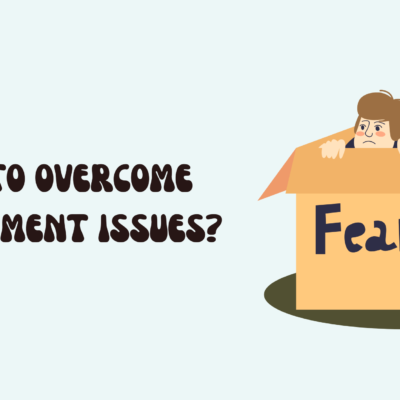How to Overcome Commitment Issues: Commitment issues can create significant challenges in personal relationships, making it difficult to form long-lasting, meaningful bonds. If you find yourself struggling to commit—whether it’s in romantic relationships, friendships, or even career choices—you’re not alone. Many people experience a fear of commitment due to past experiences, emotional baggage, or personal insecurities.
The good news is that commitment issues are not permanent. With self-awareness, emotional healing, and gradual steps, you can overcome them and build fulfilling relationships. This article explores the root causes of commitment issues, signs to look out for, and practical strategies to work through them.
Also Read:
- Signs That Say You Have a Spiritual Connection with Someone.
- How to Deal with Toxic Family Members You Live With?
- How to End a Trauma Bond Relationship?
Understanding Commitment Issues
What Are Commitment Issues?
Commitment issues, also known as commitment phobia, refer to a fear of long-term dedication to relationships, responsibilities, or major life decisions. People with commitment issues often experience anxiety, fear, or avoidance when faced with situations that require them to make long-term commitments.
Common Causes of Commitment Issues
- Fear of Vulnerability – Opening up to someone and risking emotional pain can make commitment feel overwhelming.
- Past Trauma or Heartbreak – Previous relationships that ended badly can create fear of repeating the same pain.
- Fear of Losing Freedom – Some people associate commitment with losing independence or feeling trapped.
- Unrealistic Expectations – Fear that a relationship must be “perfect” to last can create hesitation in committing.
- Low Self-Esteem – A lack of self-worth can lead to doubts about whether you are “good enough” for a long-term relationship.
- Childhood Experiences – Growing up with divorced parents, unstable relationships, or witnessing unhealthy commitments can shape commitment fears.
Understanding why you fear commitment is the first step toward overcoming it.
Signs of Commitment Issues
Commitment issues can manifest in different ways, such as:
In Romantic Relationships:
- Feeling anxious when a relationship becomes serious.
- Avoiding labels like “boyfriend/girlfriend” or “partner.”
- Losing interest after the honeymoon phase.
- Making excuses to avoid deep emotional connection.
- Sabotaging relationships when they start to feel stable.
In Friendships and Family Bonds:
- Keeping emotional distance from close friends or family.
- Avoiding deep conversations or emotional vulnerability.
- Feeling uncomfortable when others express their attachment to you.
In Career and Life Decisions:
- Struggling to commit to a long-term career path.
- Constantly second-guessing major life choices.
- Avoiding big responsibilities like buying a house or settling in one place.
Recognizing these signs in yourself can help you take proactive steps toward change.
How to Overcome Commitment Issues
1. Identify Your Fears and Triggers
To address commitment issues, you need to understand what exactly scares you about commitment. Ask yourself:
- What thoughts come to mind when I think about long-term commitment?
- Am I afraid of getting hurt, losing freedom, or failing?
- Did a past experience shape my current fears?
Journaling about your fears and experiences can help you gain clarity on what is holding you back.
2. Challenge Negative Beliefs About Commitment
Many people with commitment issues have unconscious negative beliefs about relationships. Common ones include:
- “Commitment means losing my freedom.”
- “Relationships always end in heartbreak.”
- “I’m not good at relationships, so I shouldn’t commit.”
Challenge these beliefs by replacing them with healthier perspectives:
- Truth: Commitment does not mean losing freedom—it’s about sharing your life with someone while maintaining individuality.
- Truth: Not all relationships end in heartbreak; many grow stronger over time.
- Truth: You are capable of forming deep, meaningful connections with the right effort and mindset.
Reframing your mindset will help reduce the fear associated with commitment.
3. Take Small Steps Toward Commitment
Commitment doesn’t have to be an all-or-nothing decision. Start with small steps:
- Instead of avoiding labels, try being open to defining the relationship.
- If you struggle with deep emotional conversations, start by sharing small personal details first.
- If committing to one person feels overwhelming, focus on being present in the moment instead of worrying about the future.
Gradual exposure to commitment can help reduce fear over time.
4. Work on Emotional Intimacy
Building emotional intimacy makes commitment feel safer.
Ways to Improve Emotional Intimacy:
- Practice active listening when your partner or friend shares their thoughts.
- Express your emotions openly and honestly.
- Engage in deep conversations about dreams, fears, and values.
- Show affection and appreciation in small ways.
The more comfortable you become with emotional closeness, the easier it will be to commit.
5. Address Past Trauma and Emotional Baggage
If past experiences have made you fearful of commitment, take time to heal.
Ways to Heal from Past Trauma:
- Talk to a therapist or counselor.
- Write about your past relationships to process unresolved emotions.
- Practice forgiveness (of yourself and others).
- Focus on self-love and self-care.
Healing from the past allows you to enter new commitments with a fresh perspective.
6. Communicate Your Fears with Your Partner
If you’re in a relationship, talk openly with your partner about your commitment struggles.
How to Approach the Conversation:
- Be honest: “I have some fears about long-term commitment, and I’m working on them.”
- Reassure them that it’s not about them, but about your own personal growth.
- Ask for patience and support as you work through it.
A supportive partner can help ease your anxieties instead of pressuring you.
7. Stop Overthinking the Future
Many people with commitment issues worry too much about the future—what if it doesn’t work out? What if things change?
Instead of overanalyzing, focus on the present. Ask yourself:
- Am I happy with this person today?
- Do I enjoy spending time with them?
- Are they treating me with love and respect?
By living in the present moment, commitment feels less overwhelming.
8. Develop a Secure Attachment Style
People with commitment issues often have an avoidant attachment style, meaning they fear closeness and emotional dependence.
To develop a secure attachment style:
- Work on trusting others without assuming they will leave.
- Accept that love and emotional support are natural and healthy.
- Allow yourself to be vulnerable without fear of rejection.
With time and practice, forming deep connections will feel more natural.
9. Seek Professional Help if Needed
If your commitment fears are deeply rooted, therapy can be incredibly helpful. A therapist can help you:
- Understand your fears on a deeper level.
- Develop healthier relationship patterns.
- Work through past traumas that may be affecting your present.
There’s no shame in seeking support—healing takes time, and professional guidance can make the process easier.
Final Thoughts
Overcoming commitment issues is a journey that requires patience, self-awareness, and effort. By identifying your fears, challenging negative beliefs, and taking gradual steps toward emotional connection, you can build stronger, healthier relationships.
Commitment isn’t about losing freedom—it’s about choosing to share your life with someone while still being true to yourself. The more you work on trust, vulnerability, and emotional growth, the more fulfilling your relationships will become.
Take the first step today—commit to overcoming your fears and embracing love, connection, and personal growth.








